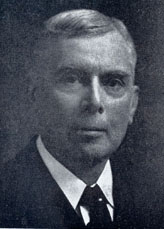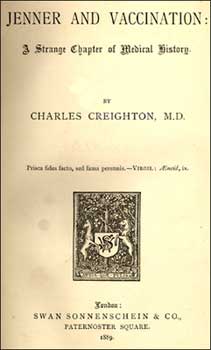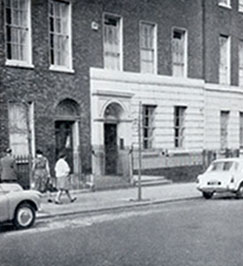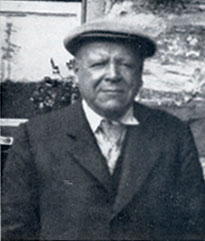|
Biography of Dr. Charles Creighton, M.A., M.D.
Dr. Creighton unmasked medicine man Jenner!!
Biography of Dr. Creighton from the Dictionary of Scientific Biography.
Dr. Creighton's house in London where he wrote his monumental History of Epidemics in Britain.
Last photograph of Dr. Creighton taken 2 years before his home-going in 1927. CHARLES CREIGHTON, M. A., M.D., died on 18 July, 1927, in the village of Upper Boddington, Northants, and was buried in the churchyard there on 20 July. He was 79 years of age. By his death Aberdeen University has lost one of her most distinguished medical graduates and Britain the most learned medical scholar and historian of his time. Charles Creighton was born in Peterhead (Scotland) on 21 November, 1847, the son of Alexander Creighton, a sawmiller and timber merchant of that town. After attending the local school he was sent to the "Gymnasium" in Old Aberdeen, then under the aegis of "Govy" Anderson. From the "Gym." he went to King's College as ninth bursar. Here he came in touch with Minto and Robertson Smith, who were his closest friends. Creighton graduated M. A. in 1867 and went on to Marischal College for medicine. After some time, and as a result, I believe, of friction with one of the professors, he left and finished his training in Edinburgh but came back to graduate M. B. in Aberdeen in 1871. He then set out on his Wanderjahre and spent a considerable time in Berlin and Vienna under Virchow and Rokitansky, the greatest pathologists of the time. He was also a pupil of the famous clinician Skoda who attended him in an attack which Creighton had diagnosed as smallpox. Returning to London, Creighton held junior posts at Charing Cross Hospital and at St. Thomas's Hospital and then went to work on the pathology of Cancer at the Brown Institution, which shortly before had been opened in London In 1877 he went to Cambridge to become assistant demonstrator of Anatomy and remained there till 1881. During this period he received the degree of M. A. Cantab. propter merita. He left Cambridge with some sort of a grievance and came to London where he resided almost continuously for the next thirty-seven years. It was in the great London libraries and particularly the British Museum that he began to collect from original sources the immense mass of material from which he wrote his great "History of Epidemics in Britain." During many years he lived a lonely life in London and only one or two people knew him socially. I first met him at a smoking concert of the "Murray ministrels" about thirty years ago. As a student in Aberdeen I had heard his name mentioned and I knew he had been a candidate for the chair of Pathology which was given to D. J. Hamilton, but during several years Creighton seemed to have vanished and it was a surprise to me to find that he was still in the flesh. We became close friends and I saw him frequently when he lived in London and I journeyed to see him in his sylvan retreat in Northampton after he had settled there. For many years he occupied bachelor chambers in Great Ormond Street, but felt constrained to leave, shortly after a German bomb dropped in his street during a raid rendered him sleepless. He was always poor and lived most frugally. When over seventy his slender means enabled him to buy, very cheaply, a neat little cottage with a minute orchard in the beautiful old world village of Upper Boddington and here he spent the last eight years of his life, admired and loved by all his neighbours and at peace with a world which had treated him harshly. Charles Creighton was an extraordinary man, odd, elusive, thoroughly sincere, attractive, but unworkable. I was perhaps his only intimate friend during the latter half of his life. He was the most learned man I ever met. He read almost all the European languages dead and living and had a smattering even of Hebrew. He knew Shakespeare and the Bible through and through and until the end of his life his wonderful memory never failed him. Although he frequently spoke as if he wished to be considered as a pathologist, it is by this "History of Epidemics in Britain" that he earned for himself a permanent place beside the great medical scholars like Daremberg, Haeser, Freind, Hirsch, Littre, Greenhill, and Francis Adams of Banchory. In my opinion, which I may say is well supported by others, Creighton's "History" is the greatest work of medical learning published in English in the nineteenth century. The volumes cover the period from 664 A.D. to 1893 and are written with such philosophical insight and such literary skill as to present to us a perfect, living picture of the calamitous periods with which they deal. Superficially, the author appears to efface himself but everywhere his master hand is visible. If many disagree with some of his opinions and conclusions Creighton's data have never been called in question, and a citation from Creighton as regards fact is regarded as an authoritative canon. He had so thoroughly sifted the historic material that he left little for successors. As the volumes appeared they were everywhere hailed as great landmarks in English medicine, but although handsomely got up by the Cambridge Press they never sold well. Years ago they used to be seen on London bookstalls for a few shillings, but today they are scarce. Creighton s monetary reward for his labours was negligible, and today his history seems to answer to the definition of a “classic" as a book habitually referred to but seldom read. Whoever has not read Creighton's book will find a story of rare value and wonderful merit. In addition to his "History," Creighton was a voluminous writer on medical and literary subjects. By his translation of Hirsch's “Handbuch der historisch-geographischen Pathologie" Creighton conferred a lasting boon on English readers. This immense effort was carried to a successful issue by Creighton entirely single-handed. He once told me it cost him twelve hours' work a day, for three years! Had it not been for Creighton's dogged perseverance and ability it is safe to say that Hirsch's indispensable and monumental work would have been a terra incognita to English readers. In his later years Creighton devoted all his energies to unravel the mysteries of Shakespeare. His pathological and Shakespearean works were regarded as of little merit and never gained a public. Their publication cost Creighton most of his hard-earned money. Under the influence of current teaching they were thought to be bizarre and improbable. Creighton saw things with a light of his own which was invisible to the majority of mankind. He was very "thrawn" and convinced he was right. He longed for the day when the film on the eyes of the world would be dispersed and things would be seen as he saw them. He could not be convinced that there was any flaw in his reasoning. He was fearless of the consequences which might fall on any one who was not in the full stream of professional accord and he was honest to the point of injuring himself and his worldly prospects. His standpoint was often one which if exceedingly improbable was impossible to disprove. What the world considered to be unlikely Creighton considered as likely if not an actual certainty. He was an admirable debater and unlike many Scotsmen had the sporting instinct which enabled him to bear with complete equanimity and composure the most hostile criticism. I have said many hard things to him but cannot recollect an instance in which I either converted him or upset him. He was an entirely self-contained man and had no need of intellectual support from his fellow creatures. He concerned himself in digging the claim which he had pegged out by himself and for himself. He could never have worked in a team with others. Although Creighton's medical knowledge was of the most up-to-date kind he was essentially a man of the past. He could never, for example, be got to admit that bacteria produced disease. He did not believe that the tubercle bacillus is the cause of tuberculosis. He considered it more probable that disease caused the appearance of tubercle bacillus. This of course is an utterly heterodox view according to present ideas, but it has to be admitted that it cannot be disproved. All that can be said is that it is exceedingly improbable. Creighton's mind could not tolerate concrete causes. He lived in an atmosphere of miasms instead of bacteria. He believed in "epidemic constitutions" and nebulous “dyscrasiae." He could not believe that any germ could cause an infective disease, although I have known him admit that the itch insect was probably the cause of itch. In 1904 Creighton travelled to India to study the Plague and he visited many places from Bombay to the Punjab. He was not convinced that the plague bacillus was the cause of the disease. He thought it was something more elusive in the soil. The real tragedy of Creighton's life was connected with his views on cow-pox and vaccination. At Robertson-Smith's request he wrote the article on “Vaccination" for the ninth edition of the “Encyclopaedia Britannica," and this article and two books which he published on the same subject literally sealed his fate. As the result of a most searching study of the data in question Creighton came to the conclusion that Jenner's doctrine that cow-pox protects against small-pox was an error if not something worse. Jenner had called his paper "An inquiry into the causes and effects of the variolae vaccine, a disease discovered in some of the Western Counties, particularly Gloucestershire, and known by the name of Cow-pox." Creighton simply could not forgive the words variolae vaccine indicating that cow-pox was small-pox of the cow. For " variolae vaccine " he considered there was no justification whatsoever. He discussed at length what sort of logical error this is, whether a catachresis, hypocorisma, metalepsis or synedoche. The term variolae vaccine is, according to Creighton a synecdoche in that it names the cause from the effect; it is a metalepsis in that it passes abruptly from the hypothetical mood to the categorical and in respect that it does both at a stroke is probably unique and without precedent among the examples known to the ancients." It was, he said, like the "conversion of a plant into an animal by the verbal play of horse chestnut and chestnut horse in the minor premiss." Creighton's suggestion was that Jenner's Latin name for cow-pox should be expunged as having no authority in fact. He even went further and alleged that what had been called vaccinal syphilis was really a "reversion of vaccinal type with disastrous consequences in the ordinary course of vaccination practice." These views created a sensation as they attempted to undermine a cherished and solid belief of the medical profession. By the anti-vaccinators he was hailed as the greatest recruit to their ranks and by the medical profession as a renegade, to be treated with disdain and obloquy. Creighton said that he deprecated no criticism but appealed to facts and he invited the most rigid criticism of his use of them or his reasoning from them. One of his critics replied that "nothing in all the history of pathology can be more grotesque, more absurd than his contention that infantile syphilis is largely due to the vaccine virus." In general, however, not a great deal was written against Creighton and the treatment adopted was to drop him into oblivion. If he was referred to at all it was merely as "Creighton, the anti-vaccinator." I had many arguments with Creighton on his views on vaccination but could never get him tied into a knot. He was not, strictly speaking, an anti-vaccinator. He was against the view taught by Jenner that cowpox is variolae vaccine and he did not believe that natural cow-pox protected against small-pox. He could never be got to argue on the real question whether what is called "vaccine" protects against smallpox or not. He always took refuge and said that is not the point, Jenner said that natural cow-pox is variolae vaccine and is protective, and I consider that he proved neither." With this sort of quibble Creighton did himself irreparable damage. All his other work was forgotten in the debacle and his reputation was ruined. He retired into himself and became almost a recluse, neglected and ostracized by the medical profession. Notwithstanding, he showed no ill-will, no fear and was never penitent. So far as I know he cherished his belief with Scottish tenacity to the last. All that I saw about Creighton as a man was to his credit and this was the impression he made on all with whom he came in contact at Upper Boddington. In his funeral sermon on Creighton the rector of the parish said that what had endeared him was the quiet, kindly, and sympathetic interest he took in all. He visited the homes of the sick and dying to give his word of advice or sympathy. Throughout life Creighton was poor, but he had no use for money beyond enough to purchase the necessities of life. Any anxiety he may have felt for his declining years was allayed by the receipt of a civil pension of £140 which Lord Asquith gave him. He not only lived on this but at his death it was found that he had been a contributor to every kind of charity and this unknown to any one. He apparently calculated to a penny what he would require for himself and the rest he gave away in money or kind.Well might the rector of Upper Boddington say that Creighton had been “an example to us all of the real meaning of charity and kindness. He was indeed a very real gentleman. May he rest in peace." In person Charles Creighton until well over seventy was a tall handsome man with a determined face. Throughout life he was a healthy, most abstemious man and a great walker. In his earlier days he had known literary celebrities like Carlyle, George Meredith and Leslie Stephen. He was very fond of classical music and was a habitual attender of St. Paul's and at concerts where he occupied the cheapest seats. In the opinion of many Creighton was a harshly treated man, but probably it could not have been otherwise and I do not believe he would have altered his career if he had had to go through it de novo. He was a fine upright character but unhelpable. He could never have done anything mean. He was a gentleman in all things. Although the antithesis of myself in his medical views, I always enjoyed his conversation and it is a pleasure to try to present a picture of Creighton's complex character, which, however, had always something sincere and likeable about it. W. BULLOCH. BIBLIOGRAPHY
OF WRITINGS OF DR. CREIGHTON. The chief works of Creighton were : Contributions
to the physiology and pathology of the breast and its lymphatic glands.
Lond., 1878. 200 pp. In addition he wrote many articles on medical subjects especially in the Journal of Anatomy and Physiology from 1878 to 1881, in Janus and elsewhere. For the ninth edition of the Encyclopaedia Britannica he wrote the article on "Malaria," "Medicine (synoptical view)," " Morgagni," " Pathology” “Pellagra," "Vaccination." He had many articles in nineteen volumes of the Dictionary of National Biography (but does not appear after 1892) and also wrote for Traill's “Social England" His Shakespearean
works were: References Bulloch, W., Aberdeen University Review, Aberdeen, Scotland, 1928. Creighton, Charles Dr., Jenner and Vaccination: A Strange Chapter of Medical History. Swan Sonnenschein & Co., London, 1889. |



